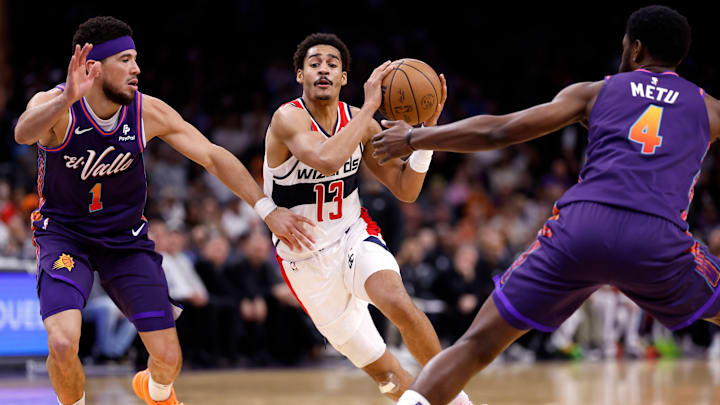Washington Wizards had one of their best performances of the season last night against the Suns in Phoenix. Leading by double digits in the third quarter, the Wizards were close to pulling off the win of the season, until the team's late-game offense cratered once again. Phoenix ended up completing the comeback and winning 112-108. There were plenty of positive takeaways from the game like Daniel Gafford and Tyus Jones' performances. However, one moment late in the game caught the eye of Wizards fans and national audiences. Jordan Poole's shot selection late in the game was the perfect encapsulation of what has been plaguing Washington all season.
Jordan Poole's Late Game Shot Attempt...pic.twitter.com/TNlylMXqkj
— WizardsMuse (@WizardsMuse1) December 18, 2023
This is an awful shot for any NBA player. It is especially awful in this case because Poole was 5/16 from the field, and 2/8 from three at this point in the game. He was not feeling it by any means. He still decided to pull up for a fadeaway three-pointer with his feet not squared up in any way, with 20 seconds left in the shot clock and 24 left in the game clock. He had plenty of time to get a better shot for himself or his teammates.
In fact, he could have pump faked, set his feet and taken a cleaner, more open look. He also had a wide-open driving lane, or an option to use Daniel Gafford as a roll man, considering he had been the most effective Wizards last night. The fact that this was the decision Poole made with the Wizards down four with the game on the line is very frustrating.
This frustration was shared by many NBA media members, who were equally baffled by Poole's decision-making.
Can we talk about the shot Jordan Poole just attempted?
— John Hollinger (@johnhollinger) December 18, 2023
Someone please tweet the video of that Jordan Poole shot, down 4 with :20 left. Please. The world should see it.
— nick wright (@getnickwright) December 18, 2023
Jordan Poole and the Washington Wizards have been struggling all season. It must not be easy for Poole to go from the Golden State Warriors dynasty to the rebuilding Wizards. However, he was brought into Washington to be one of the team leaders. This is not how you lead a team out of the mud. This is an unserious shot attempted by a player who doesn't seem to care too much about his team's on-court success. If the Wizards have any hope of looking like a respectable NBA team, this shot selection and decision-making need to stop.
